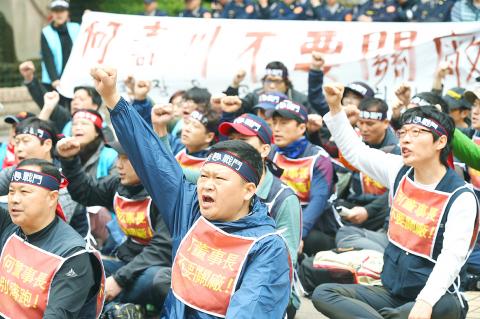Union representatives from South Korea’s Hydis Technologies, a subsidiary of Taiwanese e-paper manufacturer E Ink Holdings, yesterday held a rally in Taipei to protest E Ink’s decision to cease operations in Icheon, South Korea.
Now on their second trip to Taiwan, the South Korean workers have staged a series of demonstrations over the past week, expressing stiff opposition toward E Ink’s plans to dismiss more than 350 Hydis employees by the end of this month.
They said that it was against South Korean labor regulations for a profitable company to implement a mass layoff of its employees, adding that Hydis made more than NT$2.8 billion (US$89.81 million) last year from its patent royalties in fringe field switching — a key technology in the LCD electronics industry.

Photo: Chang Chia-ming, Taipei Times
Union representatives accused E Ink of following in the footsteps of China’s BOE Technology, which was accused of industrial espionage during its ownership of Hydis from 2003 to 2006.
Despite rainy weather, dozens of activists from Taiwanese unions joined yesterday’s demonstration to express solidarity with their South Korean counterparts.
The workers demanded a meeting with Ho Shou-chuan (何壽川), the chairman of Yeung Foong Yu Group — of which E Ink is an affiliate — after they failed to reach consensus with E Ink management during previous negotiations.
Wearing the all-white cleanroom suits that are usually worn by assembly line workers in the high-tech industry, the South Korean workers chanted slogans in Mandarin Chinese and Korean, demanding that Ho address their demands.
Halfway through the march, the workers staged a demonstration outside Ho’s house, saying that Ho and other Yuen Foong Yu Group board members repeatedly ignored their demands to engage in negotiations.
Worker Lee Mi-ok, 30, said she has worked at Hydis for more than a decade, after she was forced to terminate her college studies to provide for her family.
“After my father passed away, the burden of my family’s livelihood fell on my shoulders,” she said through an interpreter. “My mother is a strong, resilient woman. When I think about her example, I tell myself that I need to stand firm, too.”
Although E Ink said it provided favorable severance packages to the laid-off employees, the workers said that they were more interested in retaining their jobs.
“In South Korea we have a saying: ‘Dismissal is murder,’” Hydis union leader Woo Boo-ki said through an interpreter, adding that both he and his wife relied on their jobs at Hydis for their income.
In a demonstration in front of the Yuen Foong Yu Group headquarters on Tuesday, Woo and Park Ju-mun, leader of a regional union organization in South Korea’s Gyeonggi Province, had their heads shaved to protest against the shutdowns.
Chung Fu-chi (鍾馥吉), president of the employees’ union of Bank Sinopac — also a Yuen Foong Yu Group affiliate — attended the rally to express his support for the South Korean workers, saying that union organizations should stand in unity regardless of nationality.
In a statement earlier this week, E Ink said its multiyear efforts to improve the financial conditions of the company have failed and accused union representatives of “spreading rumors.”

Chinese Nationalist Party (KMT) Chairman Eric Chu (朱立倫), spokeswoman Yang Chih-yu (楊智伃) and Legislator Hsieh Lung-chieh (謝龍介) would be summoned by police for questioning for leading an illegal assembly on Thursday evening last week, Minister of the Interior Liu Shyh-fang (劉世芳) said today. The three KMT officials led an assembly outside the Taipei City Prosecutors’ Office, a restricted area where public assembly is not allowed, protesting the questioning of several KMT staff and searches of KMT headquarters and offices in a recall petition forgery case. Chu, Yang and Hsieh are all suspected of contravening the Assembly and Parade Act (集會遊行法) by holding

PRAISE: Japanese visitor Takashi Kubota said the Taiwanese temple architecture images showcased in the AI Art Gallery were the most impressive displays he saw Taiwan does not have an official pavilion at the World Expo in Osaka, Japan, because of its diplomatic predicament, but the government-backed Tech World pavilion is drawing interest with its unique recreations of works by Taiwanese artists. The pavilion features an artificial intelligence (AI)-based art gallery showcasing works of famous Taiwanese artists from the Japanese colonial period using innovative technologies. Among its main simulated displays are Eastern gouache paintings by Chen Chin (陳進), Lin Yu-shan (林玉山) and Kuo Hsueh-hu (郭雪湖), who were the three young Taiwanese painters selected for the East Asian Painting exhibition in 1927. Gouache is a water-based

Taiwan would welcome the return of Honduras as a diplomatic ally if its next president decides to make such a move, Minister of Foreign Affairs Lin Chia-lung (林佳龍) said yesterday. “Of course, we would welcome Honduras if they want to restore diplomatic ties with Taiwan after their elections,” Lin said at a meeting of the legislature’s Foreign Affairs and National Defense Committee, when asked to comment on statements made by two of the three Honduran presidential candidates during the presidential campaign in the Central American country. Taiwan is paying close attention to the region as a whole in the wake of a

OFF-TARGET: More than 30,000 participants were expected to take part in the Games next month, but only 6,550 foreign and 19,400 Taiwanese athletes have registered Taipei city councilors yesterday blasted the organizers of next month’s World Masters Games over sudden timetable and venue changes, which they said have caused thousands of participants to back out of the international sporting event, among other organizational issues. They also cited visa delays and political interference by China as reasons many foreign athletes are requesting refunds for the event, to be held from May 17 to 30. Jointly organized by the Taipei and New Taipei City governments, the games have been rocked by numerous controversies since preparations began in 2020. Taipei City Councilor Lin Yen-feng (林延鳳) said yesterday that new measures by